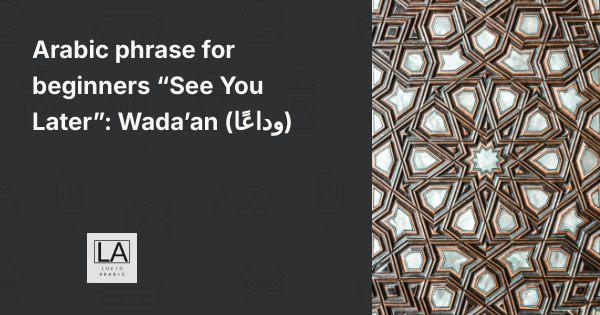Saying goodbye is a universal act of courtesy, and learning how to do it in another language is a fantastic way to show respect and build connections. Whether you’re planning a trip to an Arabic-speaking country or simply want to expand your language skills, mastering a simple goodbye phrase is a great place to start. This post will guide you through the essential Arabic farewell, “Wada’an” (وداعًا)!
Wada’an (وداعًا) – Bidding Farewell with Elegance
“Wada’an” (pronounced wa-da’-an) is a formal way to say goodbye in Arabic. It’s a versatile phrase suitable for various situations, from saying farewell to a colleague at the end of the workday to parting ways with a new friend you just met.
Check this YouTube video to listen the pronunciation:
Pronunciation Practice: Break it Down!
Here’s a breakdown of the pronunciation for “Wada’an”:
- Wa (وا): The “w” sound is similar to the English “w” in “water.”
- Da’ (دَع): The “d” is pronounced with a slight emphasis on the tongue against the top of your mouth. The “a” is a short “a” sound like the “a” in “cat.”
- an (عَن): The “an” is a guttural sound produced from the back of the throat. If you’re unfamiliar with this sound, try gargling and notice the vibration in your throat. Aim to recreate that vibration for the “an” sound.
Using Wada’an in Everyday Conversations:
“Wada’an” is most appropriate in formal settings or when addressing someone older or of higher social standing. Here are some examples of how to use it:
- You’re leaving the office for the day: “Wada’an, ila liqaa!” (وداعًا، إلى لقاء!) – Goodbye, see you later!
- Ending a conversation with a new acquaintance: “Yasarni al-mu’aarifah, wada’an!” (يسعدني المعرفة، وداعًا!) – It was nice meeting you, goodbye!
- Saying goodbye to a teacher: “Wada’an, ya ustadh/ustatha!” (وداعًا، يا أستاذ/استاذة!) – Goodbye, teacher! (Use “ustadh” for a male teacher and “ustatha” for a female teacher)
Fun Fact about Wada’an:
“Wada’an” is derived from the verb “wada’a” (ودع) which means “to deposit” or “to leave something behind.” This metaphorical connection highlights the act of leaving someone or something behind when you say goodbye.
Practice Makes Perfect!
Ready to try using “Wada’an” yourself? Here are some practice sentences:
- “Wada’an, umi! Araka fi l-masaa.” (وداعًا، أمي! أراك في المساء.) – Goodbye, mom! See you in the evening.
- “Wada’an, jiran ana aghsulu l-an.” (وداعًا، جار أنا أغسل الآن.) – Goodbye, neighbor, I’m going to wash my car now.
- “Wada’an, al-muhādharah qad intahat.” (وداعًا، المحاضرة قد انتهت.) – Goodbye, the lecture is finished.
Learning “Wada’an” is a simple yet impactful way to connect with Arabic speakers. With a little practice, you’ll be saying goodbye with confidence in no time!

